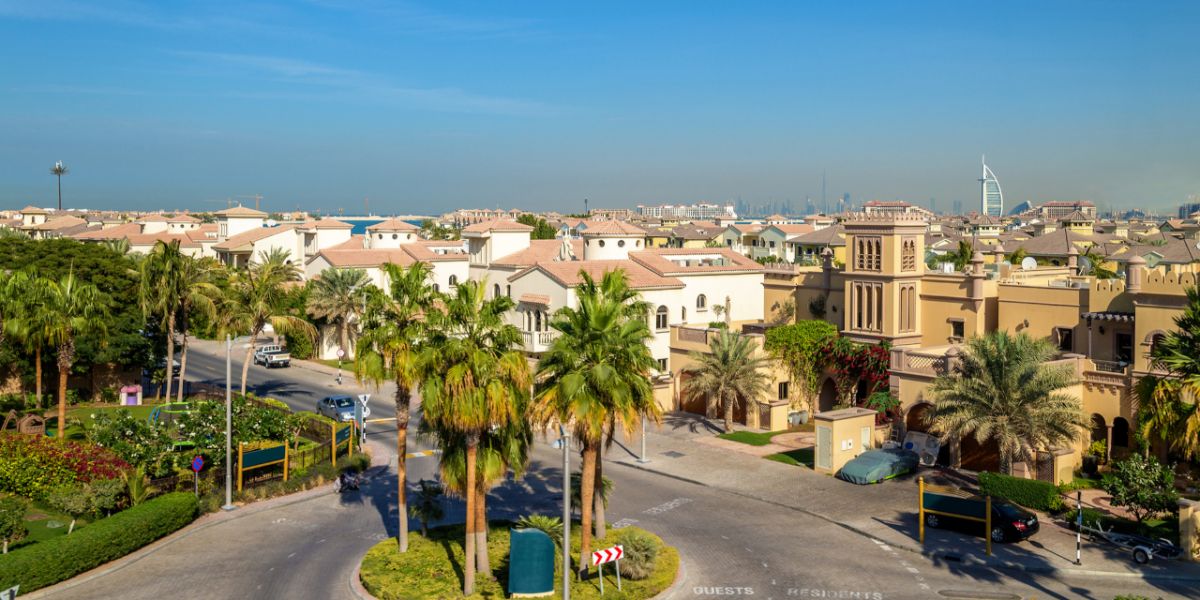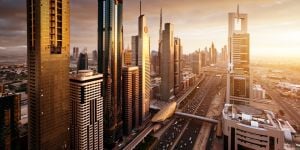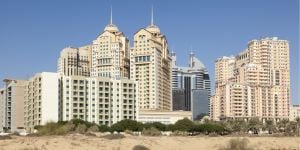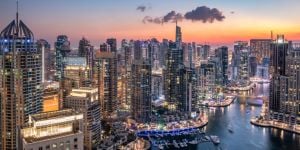
Dubai is like a drug; from the minute you step into the city as a tourist, the love affair starts. Within a short period of time, Dubai has risen from the dusty banks of old saltwater to a luxury infrastructure with many amenities.
In recent years, Dubai's economy has been growing rapidly. While other countries in the Middle East experienced oil crises, Dubai cut its dependency on oil revenue and became a champion of planning and economic growth in the MENA region. Economic growth is thus making Dubai one of the best places in the world for real estate investment.
Benefits of investing in property in Dubai
Investing in real estate can seem quite daunting – there's always the prospect of a value drop or not having consistent tenants (if you plan to rent out your property). When it comes to Dubai, there is a long list of benefits of investing in property which could resolve any doubts you may have.
Growing population
One of the benefits of buying property in Dubai is constant demographic growth. The city's population is increasing day by day, with people from all over the world coming in search of better career and business opportunities. All of them need a place to stay and settle – which is why some investors bought a few properties in the early 2000s with a firm belief in the potential of this city of the future. Today, Dubai is on its way to becoming the smartest city in the world. It is already home to the world's tallest building, “Burj Khalifa”, which is a luxury hotel with seven-star service.
As well as looking for residents to rent your property out to, there has been a growing trend of property owners listing their units on Airbnb. This means that you will also have the option of renting short-term or long-term to tourists or even freelancers who are in the city for a limited period.
High returns
Not only can you rest assured that you'll always find a tenant, but you can also benefit from the city's increased rental prices. Prices are predicted to increase by 20% in 2024 thanks to the high demand, with no signs of dropping. This means that, depending on the location of your property, you can expect a rental yield of up to 10% on your property.
Golden Visa
If you plan to move to Dubai for the long term, purchasing property can help facilitate the process. Investing at least 2 million AED in real estate in Dubai makes you eligible for the Golden Visa, a residency visa valid for 10 years and not dependent on a sponsor. You can find out more about the Golden Visa through our detailed guide to visas in the UAE.
No taxes
Another factor encouraging more people to invest in real estate is the fact that there are no taxes to be paid in Dubai. This means that once your property has been purchased, you will not need to worry about paying any income tax, property tax, or capital gain tax. Any return on investment made on your purchase will come straight to you!
Stability and safety
If you're looking to purchase a home that you will eventually live in, this point can play a big deciding role. Dubai, and the UAE in general, is known to be an extremely safe place to live in. The lack of conflict and incredibly low crime rates have attracted large numbers of expats to the city. It is the perfect place to raise a family with complete ease of mind. Additionally, if you do apply for the Golden Visa (which is renewable), you can rest assured knowing that your residency visa is secure and stable as long as your purchased property is under your ownership.
Property options in Dubai
There are three main types of properties that you can purchase in Dubai as an expat. These are freehold properties, commonhold properties, and usufruct properties.
Freehold properties
While purchasing property was previously exclusive to Emiratis, Dubai was the first emirate to amend this rule in 2002, allowing expats and foreign nationals the opportunity to fully own, buy, sell, and rent real estate.
When you purchase a property on freehold, you have full ownership of that property. In essence, you have full rights over the property and can make changes to the structure, upgrade it, and even sell, lease, or rent the property if you wish.
As this is a highly sought-after investment option by many expats, you are advised to do your research well. The designated freehold areas do not include older parts of Dubai, such as Bur Dubai or Karama, but potential investors have choices over other areas, such as Dubai South or Pearl Jumeirah. Prices, of course, vary depending on many factors, such as the size of the property or land and the location.
If you intend to rent out your property, make sure to research the process and market demand. While it might seem lucrative to invest in luxury villas, demand will need to match accordingly. With other expats coming into Dubai to work and seeking rentals, you will need to evaluate whether they are looking for property to accommodate an entire family or if it's only for a sole tenant.
A benefit of investing in freehold property is that it can be inherited and will remain in the family even after the owner passes.
The downside to freehold properties is that maintenance and upkeep are the responsibility of the owner and must be regularly checked. This can become tedious if you plan to rent out your property and live outside of Dubai.
Commonhold properties
Commonhold properties generally include condominiums, apartments, and non-residential units.
When you purchase this type of property, you will get the right to sell it or rent it out. It's quite similar to a freehold property. However, as most commonhold properties are apartments in apartment buildings and condominiums, you will need to make regular payments for property maintenance.
The benefit of commonhold properties is knowing that, with regular payments, the upkeep of your unit will be taken care of without resorting to external providers.
Usufruct properties
Usufruct properties are properties that are leased (rather than sold) for long-term investments. The occupant of the property will not be able to make any changes to it — but will have the right to rent it out. Usufruct properties can be leased for as long as 100 years.
A big benefit of using a factory is that you will not have to worry at all about maintenance and upkeep, as this is the landlord's responsibility. Anything (apart from major property damage) that will need to be repaired must be covered by the property owner. Usufruct properties also tend to be a lot more affordable.
Property prices in Dubai
The most popular areas for buying property in Dubai are:
- Downtown Dubai;
- Business Bay;
- Meydan City;
- Dubai Hills Estate;
- Arabian Ranches;
- Dubai Marina;
- Palm Jumeirah;
- Jumeirah Beach Residence;
- Dubai South;
- Town Square.
Downtown Dubai
Situated in the heart of Dubai, this is one of the most popular areas for property investment. With neighboring attractions like the Burj Khalifa and Dubai Mall, you can imagine that you will have no shortage of tenants, and rental yields will be very lucrative. You can find one-bedroom apartments starting at AED 800,000, two-bedroom apartments starting at AED 1,600,000, and three-bedroom apartments starting at AED 2,500,000.
Business Bay
Right next to Downtown Dubai is Business Bay, a bustling area with a mix of office spaces and residential buildings. It's usually seen as the more affordable option to living in the city center and is a popular choice due to its proximity to a lot of places of work. The area is also filled with a range of amenities, restaurants, and cafes. One-bedroom apartments in Business Bay start at a purchasing price of AED 750,000, while two-bedroom apartments start at AED 1,300,000, and three-bedroom apartments start at AED 2,100,000.
Meydan City
Meydan City is an area that has been growing in popularity due to its large focus on sustainability. It is a smart, eco-friendly community filled with green spaces, making it an attractive spot for families. It is considered more of a high-end neighborhood and comprises both apartment buildings and villas. Apartments in Meydan City start at AED 650,000 for one-bedrooms, AED 1,100,000 for two-bedrooms, and AED 1,500,000 for three-bedrooms. Villas are naturally priced higher, starting at AED 3,300,000 for three-bedroom villas and AED 3,900,000 for four-bedroom villas.
Dubai Hills Estate
If you're looking to purchase high-end luxury properties, Dubai Hills Estate is an ideal choice. Rental demand in this area is quite strong due to its growing development, and accessibility of day-to-day amenities. The area features a mix of apartments and villas, both built with modern aesthetics and high-quality finishing. The starting price of one-bedroom apartments is AED 990,000, AED 1,300,000 for two-bedroom apartments, and AED 2,800,000 for three-bedroom apartments. If you're interested in villas, you'll find three-bedroom villas starting at a price of AED 3,700,000 and four-bedroom villas at AED 4,000,000.
Arabian Ranches
One of the relatively older but well-kept communities in Dubai is Arabian Ranches. Focused on being family-friendly, this area is set within a gated community of beautiful townhouses and villas. It is also home to some of the best schools in Dubai, making it an excellent and in-demand option for families with children. Three-bedroom townhouses in Arabian Ranches have a starting price of AED 3,650,000, while four-bedroom townhouses start at AED 3,980,000. Villas, which are usually larger but older buildings, start at AED 3,300,000 for three bedrooms and AED 5,400,000 for four bedrooms.
Town Square
Town Square's popularity started to grow after the COVID-19 pandemic, when people started seeking larger spaces for lower costs. Although it's farther away from the city centre than the other areas, it has since been fully developed into an ideal area for families. It features multiple community areas, restaurants, cafes and other amenities, reducing the necessity to travel very far for what you would need on a day-to-day basis. Town Square features both apartments and villas, offering lifestyles suitable for everyone. You'll find the starting price of one-bedroom apartments at AED 590,000, AED 800,000 for two-bedroom apartments, and AED 1,300,000 for three-bedroom apartments. Townhouses are a little bit more expensive at AED 2,000,000 for a three-bedroom townhouse and AED 2,400,000 for a four-bedroom townhouse.
Dubai South
Following in the footsteps of Town Square, Dubai South is increasing in popularity for families looking for bigger yet affordable spaces due to its lower prices. It's even further away from the city center but is a constantly growing and developing area. Purchasing property in Dubai South is a profitable idea, as prices are lower than in other areas, but rental costs are predicted to increase steadily as the area continues to develop. One-bedroom apartments in Dubai South have a starting price of AED 430,000, with two bedrooms starting at AED 700,000 and three bedrooms starting at AED 1,250,000. Townhouses start at a price of AED 1,500,000 for three bedrooms and AED 2,000,000 for four bedrooms.
Additional charges to buying property in Dubai
Note that in addition to the price of the property you are buying, you will need to pay additional fees. Typically, these include:
- NOC (No Objection Certificate) fees: which range from AED 500 to AED 5000;
- Dubai Land Department (DLD) fees: 4% of the total property purchase price, as well as admin fees of AED 580 for apartments;
- Property Registration fees: AED 2,000 + 5% VAT for properties valued below AED 500,000, and AED 4,000 + 5% VAT for properties valued above AED 500,000;
- DLD Mortgage Registration fees: 0.25% of your total loan amount + AED 290;
- Real estate agency fees: about 2% of the total property purchase price + 5% VAT;
- Conveyance fees: typically AED 6,000 to AED 10,000;
- Bank mortgage arrangement fees: 1% of your total loan amount + 5% VAT;
- Property valuation fee: typically AED 2,500 to AED 3,500 + 5% VAT.
Depending on the type of property you are buying, there may also be additional charges: for instance, property maintenance fees.
Apart from the potential costs, there could also be extra charges that could be applied to the office of the property developer. You may also have to pay fees for a community/building to the real estate developer.
If you want to take out a mortgage on your property purchase, make sure to check with your bank about the conditions of the mortgage loans given out to foreign residents. For instance, if you are investing in a real estate property valued at close to AED 5 million, you will be able to ask for a loan of as much as 75% of the total property value.
How to purchase property in Dubai
If you've made the decision to buy property in Dubai, you'll need to be aware of the process. The first step is to find properties for sale If you're someone who enjoys doing independent research, you can find property listings for sale through online real estate listing websites like Property Finder, Bayut, and Dubizzle. Through these listings, you'll be able to see what is currently on the market and do an easy comparison of properties. Once you want to start viewing the properties and making a final decision, you will have to do it through the real estate agent who posted the listings (and will have to pay their fees). You can also opt to hire a real estate agent from the get-go. Real estate agents are usually dedicated to one or more neighborhoods in which they are experts. They will be able to guide you through the buying process, as well as provide insights and knowledge on which properties would make the best investment option. Some trusted real estate brokers in Abu Dhabi are Haus & Haus, Dubai Properties, and Driven Properties.
Once you've picked your property and are ready to make the purchase, the first step will be to draw up a buyer/seller contract. It's best to discuss the terms with the seller first, and then proceed to draft a contract that outlines all details including property price, payment method and plan, and any other terms agreed upon. You won't necessarily require a lawyer at this stage, but it's important to ensure your contract is precise.
You will then need to download a Memorandum of Understanding (MOU) from the Dubai Land Department website. This serves as the sale agreement, and can include all your agreed upon terms. This should be signed by both yourself and the seller in front of a witness. Ideally, this should happen at the Registration Trustee's office. You can expect to pay 10% of the total price to the Registration Trustee as a security deposit. Once the transaction is complete, this amount will be returned to you.
A NOC will need to be issued by the developer in order to finalize the ownership transfer. The developer will check to ensure that there are no outstanding bills or charges on the property (if there are any, the current owner must settle them before selling). Once everything has been settled, the developer will issue your certificate.
The final step is to transfer your ownership at the Registration Trustee's office. This is a fairly quick process and should be completed on the same day if all requirements are met by both parties. The documents that will be required are:
- A cheque for the property price;
- Valid Emirates ID and passport from both the buyer and the seller;
- The original NOC from the developer;
- The signed MOU form.
Once the transfer is processed, you will receive an approval email, as well as a title deed in your name.
Useful links:
We do our best to provide accurate and up to date information. However, if you have noticed any inaccuracies in this article, please let us know in the comments section below.








